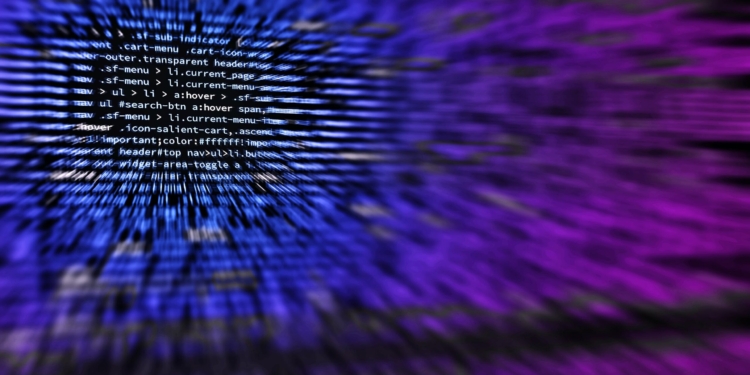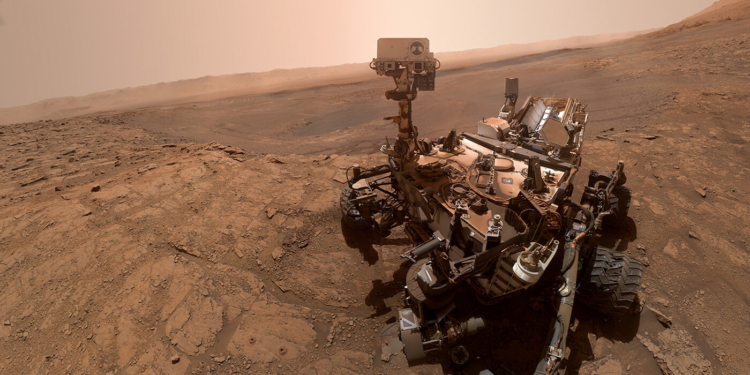Image: Hieronymus Bosch, The Garden of Earthly Delights, 1490-1510. Source: Wikipedia.
“THE REASON so much of the world seems incomprehensible is that it is incomprehensible,” writes Tim Maughan – author of, among other things, a science fiction novel, Infinite Detail – on One Zero. From automated supply chains to high-frequency trading, complexity makes the world “unknowable” by human intelligence. Worse, he points out, in order to generate more and more growth, automated systems must become ever more complex.
No single human is capable of understanding what is going on behind the screens: Every day, 82.2 years of video are uploaded to YouTube; 500 million tweets are exchanged, the equivalent of a 10 million page–book!
Back in 2014, Maughan spent a week on a container ship. And what struck him most was how every decision was made by technology. From the crane operator to the captain, everyone received instructions via management algorithms. Instructions were accepted and carried through without question, even though they were handed out without any explanation. The ship’s captain regularly received automated company emails asking him to slow down the ship. Have we already given up on motive and on the explainability of the world?
Who cares, right? As long as there is food and clothes in the stores, money in the ATMs, stories on our Instagram. Everything seems to happen on its own now, without needing to worry about it. Yet, these complex systems can break down. There is a limit to how much pressure a global supply chain (GVS) can endure. The year of 2020 has had its share of shortages, and GVSs suffer regularly from malware attacks.
Still, to date, there have been no truly catastrophic failures, as if complexity were far more resilient than expected. Despite their intrinsic opacity, it turns out that complex networks are working. We have given automated systems a lot of decision-making power to achieve objectives as efficiently as possible, and things seem to be operational.
That is, as long as you do not inspect these systems in detail, as Tim Maughan points out. Alarmingly, they do not have the capacity to make ethical decisions or moral judgments – reminding us of what Miriam Posner wrote about the limits of software-based supply chain transformation. In fact, Maughan argues, by design, a GVS perpetuates and increases inequality: It takes advantage of disparities in living standards to have goods produced in countries where costs are lowest and shipped halfway around the world to be sold at a profit.
“Like the captain of the container ship, politicians and voters have less and less control over how any of these networks run,” writes Maughan. “The result of this feels increasingly like a democratic vacuum. We live in an era where voters have record levels of distrust for politicians, partly because they can feel this disconnect – they see from everyday reality that, despite their claims, politicians can’t effect change.”
Worse, many politicians believe that we should not fix the system, but instead speed up the process of deregulation, by granting even more power to networked automation. So, concludes Maughan, we need to “increase our knowledge of the seemingly unknowable, as well as find strategies to counter the powerlessness and anxiety produced by its systems.”
Surely, one wants to agree with Tim Maughan wholeheartedly. But as systems unfold, take root, and gain in complexity, our appeals for explanation and ethics appear increasingly farfetched. Rather than demanding an ever-elusive sense of transparency, should we not look at what prevents it from materializing? Why do GVSs become less governable as they grow stronger? Perhaps their purpose is not to be governable – or, more precisely, that their structuring (which is governable) tends above all to produce ungovernability, that is to say, to reduce the capacity of those who can govern them.
The concept of “ungovernance” has been taken up by a variety of scholars in a recent issue of the Transnational Legal Theory. The concept certainly still needs refinement, as several meanings have emerged from the discussion. For some authors, ungovernance is a matter of ungovernability, or the impossibility of government due to the absence of proper structures and instruments. According to others, ungovernance is related to a retreat from governmentality, led, for example, by algorithms and artificial intelligence (the concept of algorithmic governmentality is defined by Antoinette Rouvroy and Thomas Berns as a change in the modalities of government aimed at eliminating the “very project of governing”).
Lawyers Deval Desai and Andrew Lang relate ungovernance to “big visions with claims to universality” (such as that of “markets” or the “rule of law”) that dispose of “no adequate prescriptions” of action. Global ungovernance does not necessarily mean absence of governance. It is rather about the tensions that exist between governability and globality. Success is not measured according to one’s ability to build adequate institutions, but rather in the continual articulation of the original grand vision.
For scholars Dimitri van den Meerssche and Geoff Gordon, risk and resilience embody the day’s new normative architecture. By looking at the functioning of the World Bank, these researchers point out that risk and complexity are no longer considered as conditions limiting a project, but instead as its constitutive elements. To such a degree that contingency and unknowability are themselves exploited and transformed into tools of governance.
Another scholar, Stephen Humphreys, focuses on the ungovernance of the climate crisis. After all, he reminds us, the Intergovernmental Panel on Climate Change (IPCC) has often mentioned that governance – or lack thereof – of the climate issue is a major obstacle to solving the whole problem. To put it another way, some existing governance structures represent an obstacle to climate management.
For Humphreys, ungovernance here means a temporary, strategic, or conscious rejection of checks and balances on existing institutional competences. The legal regime constructed to contain climate change is imperfect and complex, and it is embedded in a vast network of interconnected regulatory bodies. So, if the IPCC sheds light on and maps the climate crisis, it does not govern climate policy. That role is left to political decision-makers, as well as other international organizations, scientific institutions, non-governmental organizations, and even companies or individuals.
For example, when we look at sectors such as oil or aviation, the whole question becomes: What should be governed, by whom, and how? The question raised by ungovernance is not about recognizing the complexity or incoherence of policymaking. It is about understanding how interactions between ungovernance and governance can be seen as necessary, rational, or useful, rather than as contingent, irrational, wrong, or inevitable.
Humphrey says ungovernance can be experimental, inoculative, agnostic, but also catastrophic. It is the accidental or fortuitous result of a set of rational decisions, supported by a vast and selective regulatory apparatus that, above all, incorporates and assumes uncertainty in any resolution.
Likewise, Christine Bell argues that ungovernance is not to be found in the absence of law, but in its flaws, its seams and cracks, its dissonances… For Zinaida Miller, transitional justice, for example, is a form of ungovernance insofar as its objectives of justice, of appeasement, of truth, and of reconciliation appear more important than the solutions mobilized. As for Michelle Burgis-Kasthala, the Oslo Accords, which defined the terms of the relationship between Israelis and Palestinians, are based much more on a lack of governance than on clear terms of government, which allowed some actors to engage in disruptive behavior.
All in all, the non-governance or even ungovernance of technical networks and systems certainly deserves to be explored and clarified further. In a time of agile and reactive management practices, where decision-making tools strive to model the future, these systems are nevertheless struggling to design a future.
As the researcher Olivier Ertzscheid rightly pointed out: “It is perhaps precisely because governments are captivated by the (partly) false ability to predict ‘the’ future that they are also unable to design ‘a’ future. The near-certainty we have in being able to curb the world’s share of uncertainty diminishes more than it increases our capacity to act in situations of uncertainty.”
Here, we are confronted with repeating blunders that the Covid-19 pandemic has rehashed all the more. In significant ways, questions of equity and equality were put aside in favor of an efficiency that remained essential to the detriment of everything else. Yet the efficiency of the response to the pandemic also had to deal with its own operational aspects, as a prominent group of sociologists of organizations rightfully pointed out.
At the core of their work, lies the following question: Why do crises often give rise to so much organizational creativity, rendering well-prepared plans obsolete before they are even implemented? Why does the bad coordination of solutions aggravate the very problems they are supposed to solve?
According to these researchers, we tend to consider the weight of individual failures or merits while neglecting the collective and organizational dimensions of decisions. We are also led to minimize collective risks and signals, because organizations are often ill-equipped to report them. “Cooperation and coordination remain the weak link – the ‘unthought’ element – of organizational arrangements,” they write.
It is not just about looking at the big picture, but also at the frame itself. In a world saturated with organizations, we still struggle to organize them! Certainly, because this organization of organizations is intimately linked to power. The elitist and sanitary response to the Covid-19 crisis has favored short-sighted, top-down, conflictual decision-making – but here, perhaps we can still learn something, these scholars write.
How can we move from the search for guilty parties to the reform of structural causes? To start off, crisis observers must no longer draw lessons that are singular – because crises are not – but systemic. One must also rigorously denounce overconfidence, disorganizational saturation, elitist management, exuberant procedural creativity, decisional and contradictory exhaustion, and more. While recognizing that these flaws remain the common lot of all organizations.
Authoritarian command-and-control rarely produces what is expected. (It mostly produces mistrust.) Ungovernance, disorganization and the production of ungovernability may just be the various facets of a response to the same complexity. In a way, ungovernance could be an infrastructural response to uncertainty.
Likewise, opacity, democratic disconnection, and absence of ethics in policymaking seem to only serve inaction in a world where the capacity to govern is a rare good. Ungoverning is not so much a step back, as philosopher Alexandre Monnin advocated, but rather a way to ensure the continuity of the world’s current predicaments. Ungoverning is also more symptom than remedy. Above all, ungoverning clouds all sorts of governance.
This article was originally published in French at internetactu.net and has been republished under Creative Commons. It has been translated by Murillo Salvador.
Author
-
Hubert Guillaud is chief editor at internetactu.net, one of the main French-speaking sites for monitoring innovation in the field of information and communication technologies.
View all posts
Related Articles
June 7, 2021
The United Nations’ ‘Wild West’ of Artificial Intelligence
For an organization like the United Nations, artificial intelligence can have promising applications in the field. Its usage should follow strict guidelines that have yet to see the light of day.
May 31, 2021
Who Owns Space’s Natural Resources?
Space governance is emerging as a major issue of our time. In-between old multilateral rules and new bilateral developments, international cooperation on space has had a hard time materializing.
May 24, 2021
Covid-19 and the End of “Global Health”
Covid-19 has unveiled big problems with the world's handling of infectious disease. As a global problem, it has not prompted a global response. This failure of global health should not be repeated.


